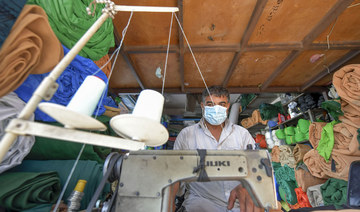LONDON: A major UK study into the role of antibodies in coronavirus cases could explain why children appear to have greater resistance to COVID-19, experts believe.
The results of the research could support the idea that antibodies triggered by common colds help to defend children against severe COVID-19 infections.
On the other hand, it could confirm fears that some immune responses may trigger deadly inflammatory reactions that could thwart attempts to develop a vaccine.
“This study could go in two very different directions,” said Michael Levin, professor of paediatrics at Imperial College London. “It could reveal that cross-reacting antibodies explain why children are less likely to suffer from severe COVID-19, or it might show that immune responses cause life-threatening effects.”
The study will include Levin’s group, a team led by Prof. George Kassiotis at London’s Francis Crick Institute, and scientists led by Dan Davis from University College London. It will involve thousands of samples already collected from existing European research.
Most of the study will concern antibodies and key immune defense proteins that can act as an antiviral “shield.”
From the outset of the pandemic, scientists have searched for antibodies against the virus in patients and healthy individuals.
To their surprise, some were found not only in samples taken from recently infected people, but in specimens collected before the outbreak.
“We discovered a small group — about 6 percent of the UK population — already had antibodies that could recognize the new virus, although they’ve never been exposed to it,” said Kassiotis.
“We realized there must be cross reactivity occurring between common cold coronaviruses and the new pandemic strain. Both are coronaviruses, after all.”
Coronaviruses cause about a fifth of UK common colds, and antibodies triggered by them latch on to COVID-19 in the body. But could they prevent COVID-19 from developing?
“Our laboratory experiments suggest this may be the case,” Kassiotis said. “These antibodies may actually protect against COVID-19.”
On average, adults suffer from common colds caused by coronaviruses once every two or three years.
But the school environment means children get them five or six times a year, Kassiotis said. As a result, about 60 percent of children have coronavirus antibodies — 10 times the level of adults.
It also seems that coronavirus antibody levels drop steeply when children leave school, raising the worry that lockdowns have lowered immunity levels among children.
“The next coronavirus to spread among them could be the pandemic strain, not the seasonal cold variety,” said Kassiotis. “That does not seem to be happening, but it is a concern.”
The new study will analyze samples to see if people possess antibodies against COVID-19, and find if they suffer any immune reactions that could be triggered by coronaviruses, including responses in T-cells.
It will also study how individuals fare as the pandemic progresses and antibodies further develop.
Kassiotis said different antibodies are created by the body’s immune system following a COVID-19 infection.
Some are specific to the latest strain, while others bind to sections shared by all coronaviruses.
By focusing on those sections, it might be possible to design a vaccine to protect against all coronaviruses, Kassiotis added. “We would then be better prepared for the next pandemic.”
But there are other parts of the immune response to COVID-19 that could have a deadly impact.
“After the pandemic began, we started seeing severely ill children with intense inflammation and multi-organ failure,” said Levin.
“We were puzzled because their illness was occurring not at the height of their infection, but several weeks after, when the virus had gone but antibodies were high. We feared those antibodies might actually be causing the damage.”
Levin said he was concerned that this development might be due to antibodies that cause later inflammation and organ damage.
If that is the case, coronavirus antibodies created by a potential vaccine could have a similar effect.
“We need to understand whether antibodies which children develop against common cold coronaviruses and COVID-19 protect against severe disease, or alternatively whether some children and adults make antibodies that might make the disease worse,” Levin said.
“Hopefully our study will give us answers and provide essential information we need to develop safe vaccines.”




























